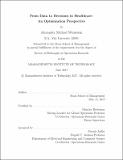| dc.contributor.advisor | Dimitris Bertsimas. | en_US |
| dc.contributor.author | Weinstein, Alexander Michael | en_US |
| dc.contributor.other | Massachusetts Institute of Technology. Operations Research Center. | en_US |
| dc.date.accessioned | 2017-10-30T15:04:16Z | |
| dc.date.available | 2017-10-30T15:04:16Z | |
| dc.date.copyright | 2017 | en_US |
| dc.date.issued | 2017 | en_US |
| dc.identifier.uri | http://hdl.handle.net/1721.1/112011 | |
| dc.description | Thesis: Ph. D., Massachusetts Institute of Technology, Sloan School of Management, Operations Research Center, 2017. | en_US |
| dc.description | This electronic version was submitted by the student author. The certified thesis is available in the Institute Archives and Special Collections. | en_US |
| dc.description | Cataloged from student-submitted PDF version of thesis. | en_US |
| dc.description | Includes bibliographical references (pages 107-110). | en_US |
| dc.description.abstract | The past few decades have seen many methodological and technological advances in optimization, statistics, and machine learning. What is still not well understood is how to combine these tools to take data as inputs and give decisions as outputs. The healthcare arena offers fertile ground for improvement in data-driven decisionmaking. Every day, medical researchers develop and test novel therapies via randomized clinical trials, which, when designed efficiently, can provide evidence for efficacy and harm. Over the last two decades, electronic medical record systems have become increasingly prevalent in hospitals and other care settings. The growth of these and other data sources, combined with the aforementioned advances in the field of operations research, enable new modes of study and analysis in healthcare. In this thesis, we take a data-driven approach to decision-making in healthcare through the lenses of optimization, statistics, and machine learning. In Parts I and II of the thesis, we apply mixed-integer optimization to enhance the design and analysis of clinical trials, a critical step in the approval process for innovative medical treatments. In Part I, we present a robust mixed-integer optimization algorithm for allocating subjects to treatment groups in sequential experiments. By improving covariate balance across treatment groups, the proposed method yields statistical power at least as high as, and sometimes significantly higher than, state-of- the-art covariate-adaptive randomization approaches. In Part II, we present a mixed-integer optimization approach for identifying exceptional responders in randomized trial data. In practice, this approach can be used to extract added value from costly clinical trials that may have failed to identify a positive treatment effect for the general study population, but could be beneficial to a subgroup of the population. In Part III, we present a personalized approach to diabetes management using electronic medical records. The approach is based on a k-nearest neighbors algorithm. By harnessing the power of optimization and machine learning, we can improve patient outcomes and move from the one-size-fits-all approach that dominates the medical landscape today, to a personalized, patient-centered approach. | en_US |
| dc.description.statementofresponsibility | by Alexander Michael Weinstein. | en_US |
| dc.format.extent | 110 pages | en_US |
| dc.language.iso | eng | en_US |
| dc.publisher | Massachusetts Institute of Technology | en_US |
| dc.rights | MIT theses are protected by copyright. They may be viewed, downloaded, or printed from this source but further reproduction or distribution in any format is prohibited without written permission. | en_US |
| dc.rights.uri | http://dspace.mit.edu/handle/1721.1/7582 | en_US |
| dc.subject | Operations Research Center. | en_US |
| dc.title | From data to decisions in healthcare : an optimization perspective | en_US |
| dc.type | Thesis | en_US |
| dc.description.degree | Ph. D. | en_US |
| dc.contributor.department | Massachusetts Institute of Technology. Operations Research Center | |
| dc.contributor.department | Sloan School of Management | |
| dc.identifier.oclc | 1006887540 | en_US |
